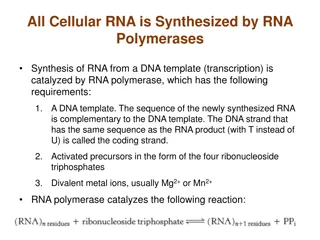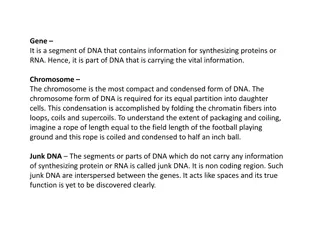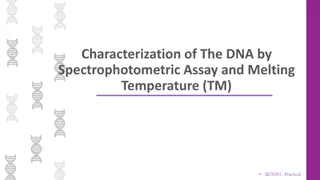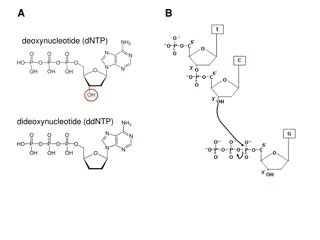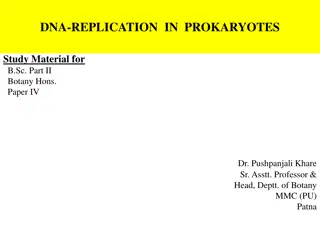Overview of Thermostable DNA Polymerases and Their Properties
Thermostable DNA polymerases play a crucial role in various molecular biology techniques, with Taq DNA polymerase being a household name due to its discovery in Thermus aquaticus. These enzymes catalyze DNA synthesis, require magnesium ions for activity, and exhibit optimal function at high temperatures. Recombinant Taq DNA polymerase is widely used in PCR applications for its stability and low error rate. In addition to Taq, other thermostable polymerases like Pfu and Vent have been studied for their properties and error rates. Understanding the characteristics of these enzymes is essential for successful DNA amplification and sequencing.
Download Presentation

Please find below an Image/Link to download the presentation.
The content on the website is provided AS IS for your information and personal use only. It may not be sold, licensed, or shared on other websites without obtaining consent from the author. Download presentation by click this link. If you encounter any issues during the download, it is possible that the publisher has removed the file from their server.
E N D
Presentation Transcript
Properties of Thermostable DNA Polymerase Yufei TU
Discovery--history of Taq DNA polymerase The original report of this enzyme, purified from the hot springs bacterium Thermus aquaticus, was published in 1976. Roughly 10 years later, the polymerase chain reaction was developed and shortly thereafter "Taq" became a household word in molecular biology circles. *THE DARNDEST PLACES: Scientists isolated the thermostable DNA polymerase Taq, an enzyme that drives PCR, from Thermus aquaticus Yellowstone type-1, a resident of geysers like this one at Yellowstone National Park.
Properties The thermophilic DNA polymerases, like other DNA polymerases, catalyze template-directed synthesis of DNA from nucleotide triphosphates. A primer having a free 3 hydroxyl is required to initiate synthesis Magnesium ion is necessary. In general, they have maximal catalytic activity at 75 to 80 , and substantially reduced activites at lower temperatures. At 37 , Taq polymerase has only about 10% of its maximal activity.
Taq DNA Polymerase Recombinant Taq DNA Polymerase is the enzyme of choice for most PCR applications. The half-life of enzyme is >40 minutes at 95 C. The error rate of Taq DNA Polymerase in PCR is 2.2x10-5 errors per nt per cycle;
Other thermostable Polymerases In addition to Taq DNA polymerase, several other thermostable DNA polymerases have been isolated and expressed from cloned genes. Three of the most-used polymerases are described in the following table: Polymerase 3'->5' Source and Properties Exonuclease From Thermus aquaticus. Halflife at 95 is 1.6 hours. Taq No From Pyrococcus furiosus. Appears to have the lowest error rate of known thermophilic DNA polymerases. Pfu Yes From Thermococcus litoralis; also known as Tli polymerase. Halflife at 95 C is approximately 7 hours. Vent Yes
The Error Rate One of the most discussed characteristics of thermostable polymerases is their error rate. Error rates are measured using several different assays, and as a result, estimates of error rate vary, particularly when the assays are performed by different labs. The total error rate 1 x 10-4to 2 x 10-5errors per base pair Taq Pfu appears to have the lowest error rate at roughly 1.5 x 10-6 error per base pair between Taq and Pfu Vent
Reliability/Fidelity Average error rates(mutation frequency/bp/duplication) increased as follows: Pfu (1.3 x 10-6) Deep Vent (2.7 x 10-6) Vent (2.8 x 10-6) Taq (8.0 x 10-6) exo- Pfu and UlTma (approximately 50 x 10-6).
Reference Voet,D, Voet,J. Biochemistry Vol.1 3rd ed. Alberts, Johnson, Lewis. Molecular Biology of The Cell 4th ed. http://arbl.cvmbs.colostate.edu/hbooks/genetics/biotech/enzymes/hotpolys.htm l http://www.pubmedcentral.nih.gov/articlerender.fcgi?artid=146123&rendertyp e=abstract http://www.fermentas.com/techinfo/pcr/dnaamplprotocol.htm http://www.fermentas.com/techinfo/pcr/pcrprotocolpfu.htm



